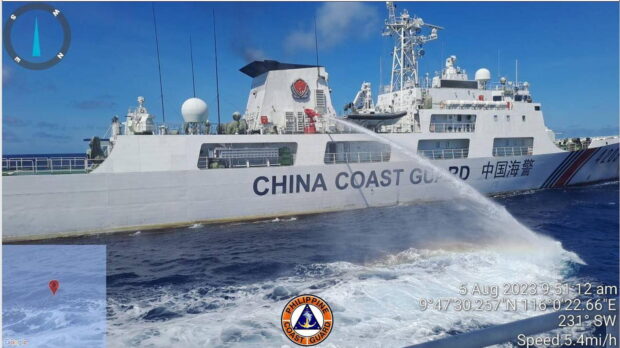
THOSE ‘MANEUVERS’ AGAIN | A China Coast Guard (CCG) ship on Saturday is seen preparing to strike a Philippine Coast Guard (PCG) vessel with a water cannon as it is on its way to Ayungin (Second Thomas) Shoal. The Armed Forces of the Philippines and the PCG criticized the “dangerous maneuvers,” urging the CCG to “act with prudence.” (Photo from the PCG Facebook page)
MANILA, Philippines — The United States and other countries on Sunday said they stand with the Philippines in the face of the “dangerous actions” of the China Coast Guard (CCG), when it fired water cannons on Saturday at a Philippine Coast Guard (PCG) vessel and a supply boat of the Philippine Navy.
The governments of Australia, Japan, Canada, and the United Kingdom (UK) as well as the European Union (EU) also released statements calling out China’s “unacceptable” and “destabilizing” maneuvers in waters within the Philippines’ exclusive economic zone (EEZ).
The US Department of State, in its statement, said China’s use of water cannons and unsafe blocking movements had “interfered with the Philippines’ lawful exercise of high seas freedom of navigation and jeopardized the safety of the Philippine vessels and crew.”
By impeding necessary provisions from reaching the Filipino service members stationed at Ayungin (Second Thomas) Shoal, China had “undertaken unwarranted interference in lawful Philippine maritime operations,” it added.
On Sunday, the Armed Forces of the Philippines said a CCG vessel blocked and fired a water cannon on a PCG boat that was on a routine troop rotation and resupply mission, “in wanton disregard of the safety of the people on board and in violation of international law.”
Harassment
A photograph from a diplomatic source also showed another CCG vessel striking a Philippine Navy boat with a water cannon.
Japanese Ambassador Kazuhiko Koshikawa said any harassment and actions that infringed on lawful activities of the sea and endanger navigational safety were “totally unacceptable.”
Canada said it “unreservedly” condemned CCG’s “dangerous and provocative actions” against Philippine vessels.
The British Embassy in Manila said China’s action “poses serious risks to regional peace and stability.”
Australia expressed concern over the CCG’s “dangerous and destabilizing” actions.
“We reiterate our call for peace, stability, and respect for Unclos (United Nations Convention for the Law of the Sea) in the South China Sea — a vital international waterway,” said Hae Kyong Yu, Australia’s ambassador to the Philippines, in a post on X (formerly Twitter).
Past incidents
EU Ambassador to the Philippines Luc Veron said the bloc “stands with the [Philippines] in upholding the rules-based international order” and “supports the legally binding nature of the 2016 South China Sea arbitration.”
The Philippines in 2013 brought an arbitral case against China before the Permanent Court of Arbitration in the Hague. Three years later it upheld the Philippines’ EEZ in accordance with Unclos and rejected China’s sweeping claims over the entire South China Sea, including Ayungin Shoal and other features within the West Philippine Sea.
Ayungin is a low-tide elevation about 194 kilometers off Palawan province. It is about 37 km northwest of Panganiban (Mischief) Reef also within the country’s EEZ, which was seized by China in 1995 and transformed since into a massive military outpost capable of launching missiles.
The Philippine military uses Navy vessels for resupply missions to its eight outposts in the West Philippine Sea. But in Ayungin, they use a pair of 24-meter wooden boats to avoid tensions otherwise raised with the presence of gray ships.
Chinese vessels constantly patrol the shoal but turn aggressive during resupply missions of Filipino troops.
In June last year, the Inquirer boarded one of two supply boats and witnessed Beijing’s intimidation up close.
Military-grade laser
Early this year, the PCG accused the China Coast Guard of directing a military-grade laser at one of its ships on a resupply mission. In recent months the CCG also conducted dangerous maneuvers to block its Filipino counterparts at least twice.
In November 2021, the Chinese coast guard blasted water cannons at resupply boats after suspecting them of carrying construction materials. The Filipino vessels were forced to abort their mission and head back to Palawan.